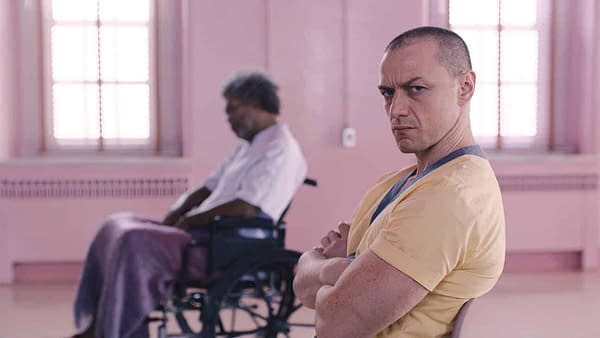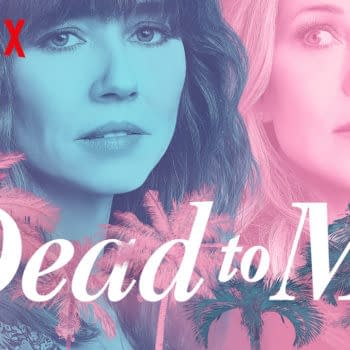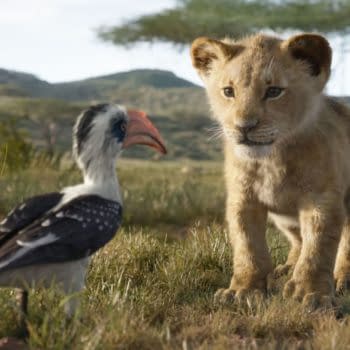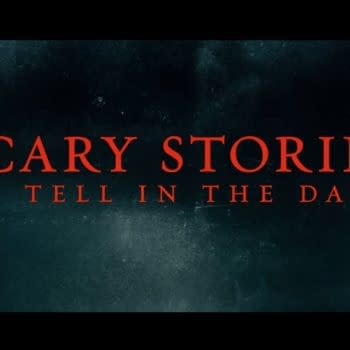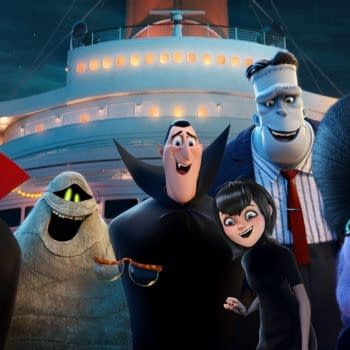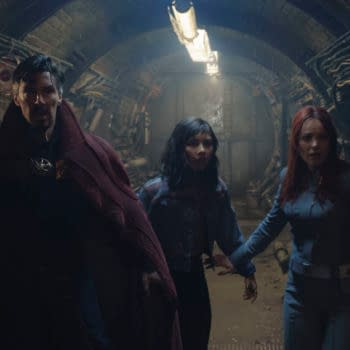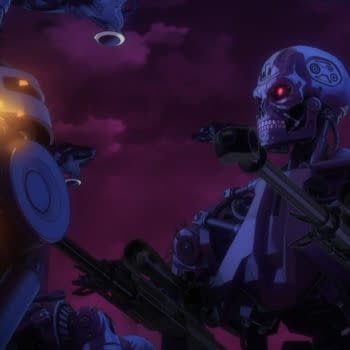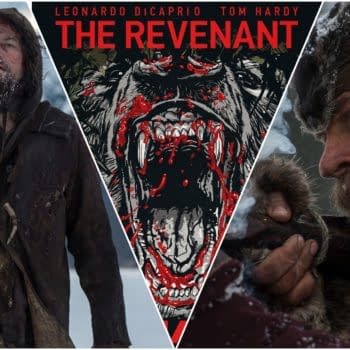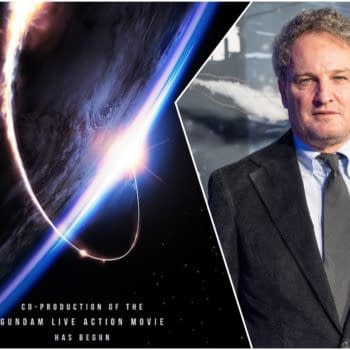Posted in: Movies | Tagged: glass, james mcavoy, m. night shyamalan, split, the horde
The Horde: James McAvoy Explains his 'Split', 'Glass' Characters
Hopefully by now, you've seen M. Night Shyamalan's film Split; a follow-up to Unbreakable, and Glass. We mean "hopefully" only due to possible spoilers that James McAvoy may reveal about his characters that make up The Horde.
While speaking with Entertainment Weekly, McAvoy took some time to explain each of the main personalities we meet in Glass, with some details that go into the portrayal of each one.
Again, if you haven't seen Split or Glass, this will have some spoilers as to who the characters are, and their purpose within the films. So. Spoiler warnings.
Kevin
Kevin appears the least of all the main characters. He's a guy that's suffered extreme physical and sexual abuse his entire childhood, and at an early age, started to dissociate and fragment. He wouldn't have been able to survive, to cope, personified on their own. Managed to overcome at times in his life, to function and be productive but, I think that he's basically receded, and he's regressed, and he can't cope. He doesn't want to be alive.
And so the rest of the group has to keep him out of consciousness because when he gains consciousness he's really ready to commit suicide, and that's just a really fucking sad place to be.
He's probably one of the closest to me — him and Barry were the closest to me. Don't get me wrong, I'm not a suicidal person and I've never been abused, thank god, but I can identify with him, and I can empathize with his need to just give up and check out. I've not felt like committing suicide but I've felt like that before, just wanting it all to go away—can't cope, can't deal.Hedwig
Hedwig was born when Kevin was 9. I think things were real real real real bad around about that age; I think he had been getting a lot of physical and sexual abuse at that point, and before that time, it was less confusing for Kevin. It wasn't pleasant, but it was right about that time he started to understand the true implications of what was happening to his body and what was happening to his mind by his family.
And that became harder to accept as he became older and more aware of the world, so at that moment, Hedwig was born, who had an indomitable spirit and had an ability to be in the craziest of environments, even incarcerated in a mental hospital and restrained, and have guns pointed at him, and still be just a kid looking for the fun. And that's why that part of Kevin dissociated. It couldn't survive as part of the whole, but it dissociated and became a separate person. He would come into Hedwig and block it out.
The central thing was to go, all right, that's the key, primary characteristic about him: he's looking for fun, no matter how dark the situation is. What was doubly interesting about him was that he was the only character who's in a state of arrested development. He's not allowed to age. It's so important for the collective that they've got someone there who can remain childlike. So I thought what would be very interesting for him would be if he felt bad about that, if he felt slightly resentful about that, and he was trying to act like one of the older boys. That's where his physical life came from. His lisp was just something that [M. Night Shyamalan] threw in one day in rehearsal. He said, "Try him with a lisp."
Dennis
Dennis has a huge barrel chest, and he breathes really slowly in and out through his nose, and so I thought, I'm going to use that. And that kind of gave me a lot of the physicality for Dennis. But the great fun of playing Dennis was playing Dennis pretending to be Barry in Split. That didn't happen in Glass.
Barry
Barry was probably my favorite character to play, but really Dennis pretending to be Barry was my favorite character to play—very straight, not unintelligent but someone with a very limited worldview trying to play an overtly gay and effeminate man. You ended up getting a straight white dude's version of that. And actually what I enjoyed about that was I found Dennis quite enjoyed slipping into that mode, and I think he found it quite liberating and quite enlightening.
Patricia
She was born around the age of 14 when Kevin was having real problems with his religious faith and his Christianity because he grew up in the church. And what was bad about that, was that I think it had been a source of constant strength for him, but by the time he was 13 or 14, he was like, "Fuck this. None of this stuff would be happening to me if there was a god out there." He lost his faith, and it was very important for him to have that faith because it was a crutch for him to lean on. So instead of losing his faith, that part of him that had the capacity to believe and hope in a higher power coming to save you—that dissociated and became Patricia, so her prime characteristic is faith and the unflappable capacity to have faith.
She was almost like a nun, but I thought it would be kind of fun in Split if she was a nun, she's celibate, but as her faith kind of warps and transfers to the Beast, then she's married to her belief in the Beast. She's still celibate, she's never had sex. She's a woman in a man's body and she can't transition because she shares it with a ton of men, and I just thought it would be interesting if she wanted to be touched. You're always looking for conflicts, whether that's between you and another character or, even better if there's conflict within the character. So someone's celibate, it'd be real interesting if they really wanted to get laid. I was thinking the whole time she's fantasizing about being touched. Especially in Split, less so in Glass because her faith has finally, truly been shaken.
In Split, you get a real kinky sense, even though she doesn't do anything or ask anything of anyone. That was my fun little secret about her, that she was sexually fantasizing at the same time wanting to be as devout as possible.
Orwell
We had 23 in Glass and 3 of them got cut in the edit. Orwell was never in the script. I don't know why, but Night never found a place for Orwell, and I was like, "Come on, we're going to do 23 and we're going to leave one behind?"
The Beast
For the Beast in the first movie, I tried to get in shape really quick, but I can only go so far. We didn't have much time to get ready, only had a few weeks. And really I was just running about in the dark at the end of the movie, so it wasn't that big a deal. And we had nice lighting and all of that. This one I said to Night, am I going to be playing the Beast a lot or just a little, and he said, "A lot." And I said, "Am I going to be indoors or outdoors? Am I going to be in a nicely lit studio where you can make me look ripped with lights or am I going to be in daylight?" And he was like, "You're going to be in daylight." I'm like "F—king hell."
So I had a guy called Magnus Lygdback who is really talented—he does Gal Gadot and he did the Skarsgaard [Alexander] guy for Tarzan and all that kind of stuff. So he really knows how to put muscle on quick. Had him when I was doing Dark Phoenix and he made me eat a ton of food and work out five and six times a week, really intensely and hard but really specifically. And he came with me to Pennslyvania and was there every single day helping me work out which muscles I had to work out for which shots I was in.
Because that's the thing: I wasn't trying to get a superhero body. It was really important I had a body that backed up the scary nature of this animalistic nature. He isn't human, he's more alien and animal than he's human and the physicality had to be scary.
"Percival"
My new favorite is a new one, a guy—I called him "Percival," he didn't have a name in the script. I think for him there was a time in Kevin's life where the world was becoming too much again and so he dissociated into someone who experienced life in the third person so that he narrates what is happening to him rather than experiencing what is happening to him. And I thought that was just an interesting, f—ked up to a life that's too much.
Split is currently in theaters.


